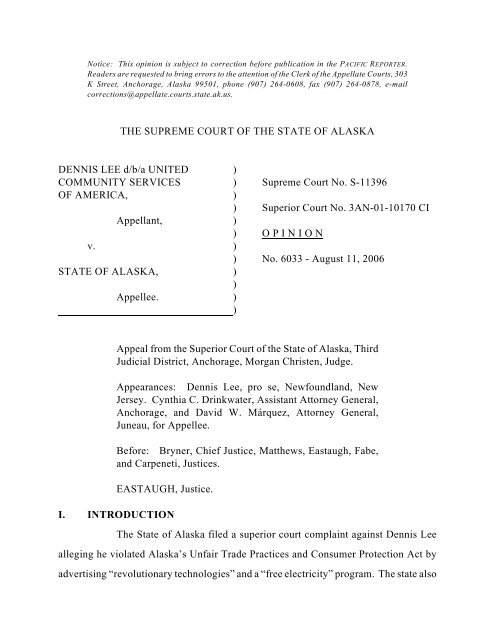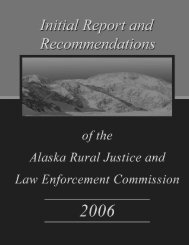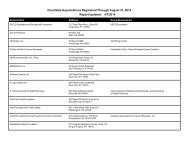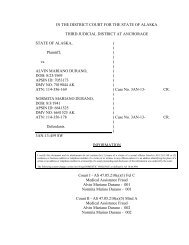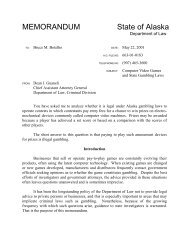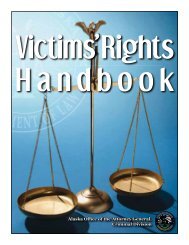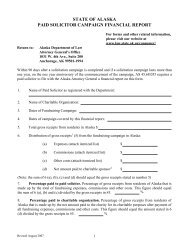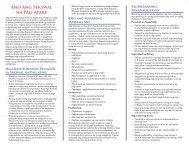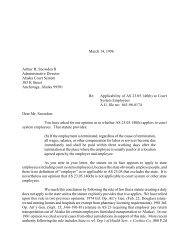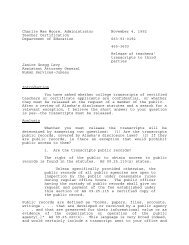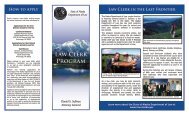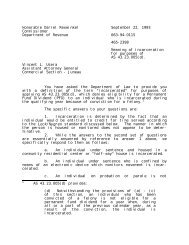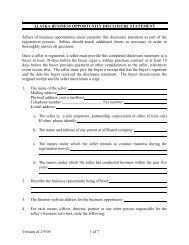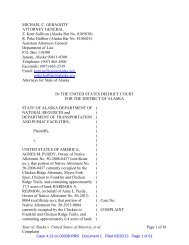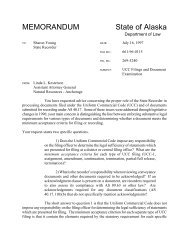Supreme Court Decision - Alaska Department of Law
Supreme Court Decision - Alaska Department of Law
Supreme Court Decision - Alaska Department of Law
Create successful ePaper yourself
Turn your PDF publications into a flip-book with our unique Google optimized e-Paper software.
Notice: This opinion is subject to correction before publication in the PACIFIC REPORTER.<br />
Readers are requested to bring errors to the attention <strong>of</strong> the Clerk <strong>of</strong> the Appellate <strong>Court</strong>s, 303<br />
K Street, Anchorage, <strong>Alaska</strong> 99501, phone (907) 264-0608, fax (907) 264-0878, e-mail<br />
corrections@appellate.courts.state.ak.us.<br />
THE SUPREME COURT OF THE STATE OF ALASKA<br />
DENNIS LEE d/b/a UNITED )<br />
COMMUNITY SERVICES ) <strong>Supreme</strong> <strong>Court</strong> No. S-11396<br />
OF AMERICA, )<br />
) Superior <strong>Court</strong> No. 3AN-01-10170 CI<br />
Appellant, )<br />
) O P I N I O N<br />
v. )<br />
) No. 6033 - August 11, 2006<br />
STATE OF ALASKA, )<br />
)<br />
Appellee. )<br />
)<br />
Appeal from the Superior <strong>Court</strong> <strong>of</strong> the State <strong>of</strong> <strong>Alaska</strong>, Third<br />
Judicial District, Anchorage, Morgan Christen, Judge.<br />
Appearances: Dennis Lee, pro se, Newfoundland, New<br />
Jersey. Cynthia C. Drinkwater, Assistant Attorney General,<br />
Anchorage, and David W. Márquez, Attorney General,<br />
Juneau, for Appellee.<br />
Before: Bryner, Chief Justice, Matthews, Eastaugh, Fabe,<br />
and Carpeneti, Justices.<br />
EASTAUGH, Justice.<br />
I. INTRODUCTION<br />
The State <strong>of</strong> <strong>Alaska</strong> filed a superior court complaint against Dennis Lee<br />
alleging he violated <strong>Alaska</strong>’s Unfair Trade Practices and Consumer Protection Act by<br />
advertising “revolutionary technologies” and a “free electricity” program. The state also
obtained a temporary restraining order enjoining Lee from soliciting <strong>Alaska</strong>n consumers<br />
to buy his products or join his discount buying club. Lee refused to participate<br />
meaningfully in discovery, even after the superior court issued orders compelling him<br />
to do so. In a thoughtful and well-reasoned decision, the superior court imposed liabilityestablishing<br />
discovery sanctions and civil penalties. We affirm.<br />
II.<br />
FACTS AND PROCEEDINGS<br />
On August 29, 2001 the State <strong>of</strong> <strong>Alaska</strong> filed a superior court complaint<br />
against Dennis Lee doing business as United Community Services <strong>of</strong> America (UCSA).<br />
The complaint alleged that Lee, UCSA, and two associated corporate entities, Best World<br />
Technologies and the International Tesla Electric Corporation (ITEC), had engaged in<br />
and continued to engage in unfair or deceptive acts or practices. It also alleged that the<br />
defendants violated the Unfair Trade Practices and Consumer Protection Act (UTPCPA) 1<br />
by falsely and deceptively advertising “revolutionary technologies” and a “free<br />
2<br />
electricity” program on the internet and in the Anchorage Daily News. The ITEC<br />
1<br />
AS 45.50.471 et seq.<br />
2<br />
The advertisement appearing in the Anchorage Daily News was entitled<br />
“Prepare To Be Shocked By Technology The Government And Big Business Do Not<br />
Want You To Know Exists!” (Emphasis omitted.) The advertisement stated that<br />
attendees at an Anchorage presentation would witness “with [their] own eyes” numerous<br />
“things the ‘experts’ say are ‘impossible.’ ” The advertisement included these<br />
statements:<br />
• We will prove water can flow up hill without using a<br />
pump. Move a lake to a mountaintop.<br />
• You can burn pure water to cut through thick steel or<br />
even use it as fuel for an internal combustion engine.<br />
• You can transmutate the nucleus <strong>of</strong> an atom to<br />
neutralize radioactive waste. We will do it for our<br />
(continued...)<br />
-2- 6033
website also announced related opportunities to invest in “NASDAC,” a “special<br />
discount buying club,” which, among other things, <strong>of</strong>fered commissions to members who<br />
became “recruiters.”<br />
Lee was scheduled to conduct an August 30, 2001 Anchorage presentation<br />
at which he would demonstrate his technologies and <strong>of</strong>fer consumers an opportunity to<br />
sign up to “possibly” get free electricity for life. Before the presentation began, the state<br />
served Lee with its complaint and a temporary restraining order (TRO) enjoining him<br />
from soliciting <strong>Alaska</strong>n consumers to pay him for products, memberships, dealerships,<br />
or other investments related to a “free electricity” program. The TRO stated that Lee<br />
2<br />
(...continued)<br />
audience.<br />
• Use pickle juice, soda pop, water, sugar, crude oil or<br />
old transmission gear oil, gas, soy sauce, even human<br />
urine, as fuel to run an internal combustion engine<br />
with no contaminants released to the environment.<br />
• We’ll demonstrate the world’s most efficient electric<br />
generator ever built . . . The Sundance Generator.<br />
• Car engines can be modified to run on 80% water and<br />
20% gas right now! You can sign up to modify your<br />
car!<br />
• Buy a furnace that runs on fumes from your septic tank<br />
to heat and cool your home and make all your hot<br />
water.<br />
• See the Tornado Engine that harnesses the awesome<br />
power <strong>of</strong> a tornado to provide power for our generator.<br />
The advertisement also stated that presentation attendees could “Sign Up To Possibly Get<br />
All Your Electricity For The Rest Of Your Life Absolutely Free!” (Emphasis omitted.)<br />
The internet page advertising the <strong>Alaska</strong> presentation listed these and other technologies<br />
that would be demonstrated at the presentation.<br />
-3- 6033
could still give the demonstration. Lee gave the demonstration and distributed<br />
applications for membership and a “notice <strong>of</strong> right to cancel” membership in the discount<br />
buying club.<br />
As the state’s lawsuit against him proceeded, Lee repeatedly thwarted the<br />
pretrial discovery process. The state made numerous attempts by telephone and letter to<br />
obtain Lee’s initial disclosures, but he never provided them. Lee responded late to the<br />
state’s interrogatories and requests for production and admission. Not satisfied with<br />
Lee’s responses, the state moved to compel discovery and moved for attorney’s fees. On<br />
August 31, 2002 the superior court ordered Lee to answer some <strong>of</strong> the state’s<br />
interrogatories and to produce specific documents in response to the requests for<br />
production. He was to comply within ten days. Lee filed a reconsideration motion,<br />
which the superior court denied.<br />
Lee did not provide the discovery the order required. On November 1, 2002<br />
the state filed a motion invoking <strong>Alaska</strong> Civil Rule 37. The state’s motion asked for an<br />
order requiring Lee to show cause why he should not be held in contempt for failing to<br />
obey the court’s discovery order. The state also requested that, if Lee failed to respond<br />
to the court’s order to show cause, the facts alleged in the complaint be deemed admitted.<br />
The superior court scheduled a show cause hearing and warned Lee that if he did not<br />
appear at the hearing, the court would consider accepting as established the factual<br />
allegations in the state’s complaint. Lee did not attend the show cause hearing.<br />
Following the hearing, the court issued an order on the state’s motion. The order gave<br />
Lee one more week in which to provide the ordered discovery responses. Lee did not<br />
provide the responses. The court then issued a supplemental order granting the state’s<br />
request that the facts alleged in the complaint be deemed admitted.<br />
-4- 6033
In June 2003 the state moved for summary judgment. It argued that there<br />
were no genuine issues <strong>of</strong> material fact because the court had accepted all facts as alleged<br />
in the state’s complaint. Lee responded. The superior court granted the state’s motion,<br />
concluding that Lee had violated the UTPCPA.<br />
The state then asked the superior court to impose civil penalties against Lee.<br />
After a hearing on the issue, the court issued a final judgment and order on the motion<br />
for civil penalties. The court enjoined Lee from making unsubstantiated claims about<br />
products <strong>of</strong>fered for sale and from advertising or soliciting for programs related to those<br />
products. The court ordered Lee to refund payments for dealerships, memberships, or<br />
products upon request by <strong>Alaska</strong> residents, and imposed civil penalties <strong>of</strong> $30,000. The<br />
court also awarded costs and attorney’s fees to the state.<br />
3<br />
Lee appeals pro se.<br />
III.<br />
DISCUSSION<br />
A. Standard <strong>of</strong> Review<br />
We review discovery orders under the deferential abuse <strong>of</strong> discretion<br />
4<br />
standard. Reversal under this standard is warranted only when, after reviewing the<br />
whole record, we are left with a definite and firm conviction that the superior court<br />
5<br />
erred. But we apply our independent judgment in deciding the legal question whether<br />
6<br />
the superior court weighed the appropriate factors in issuing a discovery order.<br />
3<br />
counsel.<br />
4<br />
5<br />
6<br />
Lee was represented in the superior court by both corporate and local<br />
Coulson v. Marsh & McLennan, Inc., 973 P.2d 1142, 1146 (<strong>Alaska</strong> 1999).<br />
Nelson-Lizardi v. Lizardi, 49 P.3d 236, 239 (<strong>Alaska</strong> 2002).<br />
Coulson, 973 P.2d at 1146.<br />
-5- 6033
A superior court’s imposition <strong>of</strong> sanctions under <strong>Alaska</strong> Rule <strong>of</strong> Civil<br />
Procedure 37(b) for a party’s failure to comply with a discovery order is also reviewed<br />
7<br />
for abuse <strong>of</strong> discretion. But we use our independent judgment to decide the legal issue<br />
8<br />
whether Civil Rule 37(b)(2) applies to a given fact situation. A superior court’s<br />
discretion to impose liability-establishing sanctions is limited. 9<br />
Whether Lee violated the temporary restraining order is a mixed question<br />
<strong>of</strong> law and fact. We review the superior court’s factual findings under the clearly<br />
10 11<br />
erroneous standard. We review questions <strong>of</strong> law de novo.<br />
B. The Superior <strong>Court</strong> Did Not Abuse Its Discretion when It Granted<br />
the State’s Motion To Compel Discovery.<br />
The superior court ordered Lee to answer some <strong>of</strong> the state’s interrogatories<br />
and to produce some <strong>of</strong> the documents requested. Lee argues that the court erred in<br />
compelling discovery because (1) the state was pursuing irrelevant information; (2) he<br />
tried to comply with the discovery requests; (3) he requested a protective order; and (4)<br />
the discovery order should have included specific findings <strong>of</strong> fact and conclusions <strong>of</strong> law.<br />
We find no merit in these contentions.<br />
First, the superior court did not compel irrelevant discovery. Lee argues<br />
that the court’s relevancy determination should have been based on “the pleadings as<br />
filed.” (Emphasis omitted.) <strong>Alaska</strong> Rule <strong>of</strong> Civil Procedure 26(b)(1) provides:<br />
7<br />
8<br />
9<br />
10<br />
DeNardo v. ABC Inc. RVs Motorhomes, 51 P.3d 919, 922 (<strong>Alaska</strong> 2002).<br />
McGilvary v. Hansen, 897 P.2d 605, 606 n.2 (<strong>Alaska</strong> 1995).<br />
Id.<br />
DeNardo, 51 P.3d at 992.<br />
11<br />
Webb v. State, Dep’t <strong>of</strong> Revenue, Child Support Enforcement Div. ex rel.<br />
Webb, 120 P.3d 197, 198 (<strong>Alaska</strong> 2005).<br />
-6- 6033
Parties may obtain discovery regarding any matter, not<br />
privileged which is relevant to the subject matter involved in<br />
the pending action . . . . The information sought need not be<br />
admissible at the trial if the information sought appears<br />
reasonably calculated to lead to the discovery <strong>of</strong> admissible<br />
evidence.<br />
As we have previously explained, discovery rules are to be broadly construed and<br />
12<br />
“relevance for purposes <strong>of</strong> discovery is broader than for purposes <strong>of</strong> trial.” Lee is<br />
therefore incorrect in asserting that the superior court should have limited discovery to<br />
information directly related to the pleadings. The state requested information about<br />
<strong>Alaska</strong>n members in Lee’s organizations and <strong>Alaska</strong>n consumers <strong>of</strong> Lee’s products, as<br />
well as information about Lee’s companies’ technologies and employees. The state also<br />
requested that Lee identify and produce certain corporate documents. These requests<br />
related to Lee’s personal jurisdiction defense and to the question whether Lee was<br />
deceptively advertising. The superior court did not abuse its discretion when it ordered<br />
Lee to respond to some <strong>of</strong> the state’s discovery requests.<br />
Second, Lee did not attempt to comply with the discovery requests. Lee<br />
argues that he “repeatedly <strong>of</strong>fered to demonstrate all products to [the state], in a private<br />
show, to prove to [the state] that the products worked as claimed.” The civil rules do not<br />
13<br />
allow for this kind <strong>of</strong> response to interrogatories and requests for production. The state<br />
12<br />
Hazen v. Municipality <strong>of</strong> Anchorage, 718 P.2d 456, 461 (<strong>Alaska</strong> 1986); see<br />
also Carstens v. Carstens, 867 P.2d 805, 808-09 (<strong>Alaska</strong> 1994) (holding that mental<br />
health and joint counseling records <strong>of</strong> divorcing parties are relevant in divorce action<br />
because they presumably contain information about parties’ conduct toward each other).<br />
13<br />
See <strong>Alaska</strong> R. Civ. P. 33(b)(1) (“Each interrogatory shall be answered<br />
separately and fully in writing under oath, unless it is objected to, in which event the<br />
objecting party shall state the reasons for objection and shall answer to the extent the<br />
interrogatory is not objectionable.”); <strong>Alaska</strong> R. Civ. P. 34(b) (“The party upon whom the<br />
(continued...)<br />
-7- 6033
might have chosen to withdraw some or all <strong>of</strong> its pending discovery requests in exchange<br />
for accepting Lee’s demonstration <strong>of</strong>fer, but it was not obliged to do so. With regard to<br />
<strong>Alaska</strong> Civil Rule 26(a) disclosures, those initial disclosures are mandatory and a private<br />
showing <strong>of</strong> Lee’s technology would not have supplied the information the rule requires. 14<br />
Third, the superior court did not abuse its discretion when it denied Lee’s<br />
request for a protective order after finding that the request was improperly raised and<br />
untimely. Lee first raised the issue <strong>of</strong> a protective order in his motion for reconsideration<br />
after the court entered the order compelling discovery. But a motion for reconsideration<br />
15<br />
is not the proper vehicle for seeking a protective order for the first time. And issues<br />
16<br />
raised for the first time in a motion for reconsideration are untimely. Lee should have<br />
sought relief under <strong>Alaska</strong> Civil Rule 26(c), but he did not do so before entry <strong>of</strong> the order<br />
compelling discovery. 17<br />
Fourth, the superior court was not obligated to issue findings <strong>of</strong> fact and<br />
conclusions <strong>of</strong> law in conjunction with its orders compelling discovery and denying<br />
Lee’s motion to reconsider. These orders were issued under authority <strong>of</strong> Civil Rules 26<br />
13<br />
(...continued)<br />
request is served shall serve a written response within 30 days.”).<br />
14<br />
See <strong>Alaska</strong> R. Civ. P. 26(a)(1).<br />
15<br />
See <strong>Alaska</strong> R. Civ. P. 77(k) (motion to reconsider used to ask court to<br />
reconsider its previous decision when court misapplied or failed to consider directly<br />
controlling law, overlooked or misconceived material fact or issue, or when law applied<br />
in ruling has since changed).<br />
16<br />
Stadnicky v. Southpark Terrace Homeowner’s Ass’n, 939 P.2d 403, 405<br />
(<strong>Alaska</strong> 1997).<br />
17<br />
<strong>Alaska</strong> Rule <strong>of</strong> Civil Procedure 26(c) provides: “Upon motion by a party<br />
. . . the court . . . may make any order which justice requires to protect a party . . . from<br />
annoyance, embarrassment, oppression, or undue burden or expense.”<br />
-8- 6033
and 77. Civil Rule 52(a) states that “[f]indings <strong>of</strong> fact and conclusions <strong>of</strong> law are<br />
unnecessary on decisions <strong>of</strong> motions under Rules 12 or 56 or any other motion except as<br />
18<br />
provided in Rule 41(b).” Lee mistakenly reads our instruction in Coulson v. Marsh &<br />
McLennan, Inc. — that “[t]rial courts should enter express rulings on motions to compel”<br />
19<br />
discovery — as a mandate to enter findings <strong>of</strong> fact and conclusions <strong>of</strong> law. The<br />
superior court here issued a written ruling on the state’s motion to compel discovery and<br />
a written ruling on Lee’s motion for reconsideration; it did not err by not issuing findings<br />
<strong>of</strong> fact and conclusions <strong>of</strong> law in conjunction with those orders.<br />
C. The Superior <strong>Court</strong> Did Not Err in Granting the State’s Request for<br />
Civil Rule 37(b) Sanctions.<br />
Eighteen months after the state filed its complaint, the superior court<br />
granted the state’s motion for an order to show cause why Lee should not be held in<br />
20<br />
contempt. It decided that the sanction <strong>of</strong> establishing facts that in turn establish<br />
1999).<br />
18<br />
19<br />
<strong>Alaska</strong> R. Civ. P. 52(a) (emphasis added).<br />
See Coulson v. Marsh & McLennan, Inc., 973 P.2d 1142, 1146 (<strong>Alaska</strong><br />
20<br />
The state’s motion relied on <strong>Alaska</strong> Civil Rule 37(b)(2)(A) and (D). Civil<br />
Rule 37(b)(2) provides in part:<br />
If a party . . . fails to obey an order to provide or permit<br />
discovery . . . , the court in which the action is pending may<br />
make such orders in regard to the failure as are just, and<br />
among others the following:<br />
(A) An order that the matters regarding which the<br />
order was made or any other designated facts shall be taken<br />
to be established for the purposes <strong>of</strong> the action in accordance<br />
with the claim <strong>of</strong> the party obtaining the order;<br />
. . .<br />
(continued...)<br />
-9- 6033
liability was warranted. The court found that Lee’s violations <strong>of</strong> the court’s orders were<br />
willful, that they prejudiced the state, and that lesser sanctions would be ineffective at<br />
deterring future violations. But in a final effort to give the parties an opportunity to try<br />
the case on the merits, the court gave Lee one additional week in which to provide<br />
discovery responses. The court promised to enter an order deeming all allegations in the<br />
state’s complaint admitted if no responses were filed. Lee did not respond. In a<br />
supplemental order issued one week after its original order on the state’s show cause<br />
motion, the superior court granted the state’s request that the facts set forth in its<br />
complaint be deemed admitted as a Rule 37(b) sanction.<br />
<strong>Alaska</strong> Civil Rule 37(b) gives judges broad discretion to enforce discovery<br />
21<br />
orders through sanctions. Before imposing Rule 37(b) sanctions, Rule 37(b)(3)<br />
requires the court to consider:<br />
(A) the nature <strong>of</strong> the violation, including the willfulness <strong>of</strong><br />
the conduct and the materiality <strong>of</strong> the information that the<br />
party failed to disclose;<br />
(B)<br />
the prejudice to the opposing party;<br />
(C) the relationship between the information the party<br />
failed to disclose and the proposed sanction;<br />
(D) whether a lesser sanction would adequately protect the<br />
opposing party and deter other discovery violations;<br />
20<br />
(...continued)<br />
(D) In lieu <strong>of</strong> any <strong>of</strong> the foregoing orders or in<br />
addition thereto, an order treating as a contempt <strong>of</strong> court the<br />
failure to obey any orders except an order to submit to<br />
physical or mental examination . . . .<br />
21<br />
DeNardo v. ABC Inc. RVs Motorhomes, 51 P.3d 919, 922 (<strong>Alaska</strong> 2002);<br />
see also <strong>Alaska</strong> R. Civ. P. 37(b); Hawes Firearms Co. v. Edwards, 634 P.2d 377, 378<br />
(<strong>Alaska</strong> 1981) (quoting Oaks v. Rojcewicz, 409 P.2d 839, 844 (<strong>Alaska</strong> 1966)).<br />
-10- 6033
(E) other factors deemed appropriate by the court or<br />
required by law. [ 22]<br />
Rule 37(b)(3) also prohibits the court from issuing an order that has the “effect <strong>of</strong><br />
establishing or dismissing a claim or defense or determining a central issue in the<br />
litigation” without first finding that the party acted willfully. 23<br />
The superior court followed the correct analysis in applying the Rule<br />
37(b)(3) factors. First, the court permissibly found that Lee’s noncompliance was<br />
willful. We define “willfulness” in the context <strong>of</strong> Civil Rule 37(b) as the “conscious<br />
24<br />
intent to impede discovery, and not mere delay, inability or good faith resistance.” Lee<br />
argues that he was only seeking invocation <strong>of</strong> “the protections provided to him by law.”<br />
But Lee repeatedly, in papers filed in the court, at hearings through counsel in the<br />
superior court, and here on appeal, has argued that the state has no right to the discovery<br />
requested. As explained above in Part III.B, Lee never properly moved for a protective<br />
order. Lee’s own attorney admitted at the hearing on civil penalties that Lee’s<br />
noncompliance was “contemptuous” and “intentional.”<br />
Lee suggests that the superior court should have informed him <strong>of</strong> his right<br />
to seek interlocutory review under Appellate Rule 402 and that his failure to comply with<br />
the discovery orders should be excused because he assumed that he could not appeal the<br />
order compelling discovery. At the show cause hearing, Lee’s corporate counsel argued<br />
that Lee wanted to appeal the discovery order but had to wait until the court entered a<br />
22<br />
<strong>Alaska</strong> R. Civ. P. 37(b)(3).<br />
23<br />
<strong>Alaska</strong> R. Civ. P. 37(b)(3); see DeNardo, 51 P.3d at 922-23 (paraphrasing<br />
standard for imposing sanctions under <strong>Alaska</strong> R. Civ. P. 37(b)(3)).<br />
24<br />
DeNardo, 51 P.3d at 923 (quoting Hawes Firearms, 634 P.2d at 378). The<br />
noncomplying party has the burden <strong>of</strong> proving that his failure to comply was not willful.<br />
Id.<br />
-11- 6033
final judgment. Lee’s corporate counsel may have been unfamiliar with interlocutory<br />
25<br />
review in <strong>Alaska</strong>. But the superior court had no duty to inform Lee — a defendant<br />
represented in the superior court by both local and corporate counsel — that he had a<br />
26<br />
right to file a petition seeking interlocutory review. The court’s job is to be a neutral<br />
arbiter, not an instructor. Because Lee was trying to avoid discovery and because the<br />
court had no obligation to inform him <strong>of</strong> the <strong>Alaska</strong> rules, the superior court did not err<br />
when it found that Lee’s violation was a “knowing, willful refusal” to comply with the<br />
order. 27<br />
Second, the superior court did not err in determining that Lee’s violation<br />
prejudiced the state. As the superior court found, Lee’s omissions delayed progress in<br />
the case and forced the state to either depose Lee without the aid <strong>of</strong> written discovery or<br />
conduct a trial without benefit <strong>of</strong> any meaningful discovery. 28<br />
Third, the superior court did not err in finding a nexus between the withheld<br />
discovery and the proposed sanction. A sanction under Rule 37(b)(2) must be<br />
29<br />
“sufficiently related” to the discovery violation. “The test for the validity <strong>of</strong> a<br />
25<br />
26<br />
See <strong>Alaska</strong> R. App. P. 402.<br />
See id.<br />
27<br />
See DeNardo, 51 P.3d at 923 (finding DeNardo’s noncompliance willful,<br />
in part, because “[r]ather than showing that his failure to comply was not willful . . .<br />
DeNardo repeatedly claimed that [the appellee] had no right to the answers or<br />
documents”).<br />
28<br />
See id. at 925 (noting that parties are entitled to discovery <strong>of</strong> information<br />
relevant to their claims or defenses so they can prepare for litigation).<br />
29<br />
McGilvary v. Hansen, 897 P.2d 605, 607 (<strong>Alaska</strong> 1995); Underwriters at<br />
Lloyd’s London v. The Narrows, 846 P.2d 118, 119-20 (<strong>Alaska</strong> 1993); Honda Motor Co.<br />
v. Salzman, 751 P.2d 489, 493 (<strong>Alaska</strong> 1988).<br />
-12- 6033
discovery sanction that dismisses claims or orders facts or issues to be taken as<br />
established under [Rule 37(b)(2)] is whether these claims or issues are elements <strong>of</strong> the<br />
dispute that cannot be determined on the merits without disclosure <strong>of</strong> the evidence the<br />
30<br />
court has ordered the party to produce.” “If the issues established are not sufficiently<br />
related to the withheld information, the discovery sanction is considered mere<br />
punishment and is impermissible.” 31<br />
All <strong>of</strong> the information withheld related to the question whether Lee was<br />
making false claims or misrepresenting his technologies. The state’s complaint alleged<br />
that Lee engaged in false or deceptive advertising in the Anchorage Daily News and<br />
internet advertisements. The state alleged that such conduct constitutes unfair or<br />
deceptive acts or practices in violation <strong>of</strong> AS 45.50.471(a) and AS 45.50.471(b)(12).<br />
<strong>Alaska</strong> Statute 45.50.471(a) declares that “[u]nfair methods <strong>of</strong> competition and unfair or<br />
deceptive acts or practices in the conduct <strong>of</strong> trade or commerce” are unlawful. <strong>Alaska</strong><br />
Statute 45.50.471(b)(12) provides that the terms “unfair methods <strong>of</strong> competition” and<br />
“unfair or deceptive acts or practices” include<br />
using or employing deception, fraud, false pretense, false<br />
promise, misrepresentation, or knowingly concealing,<br />
suppressing, or omitting a material fact with intent that others<br />
rely upon the concealment, suppression or omission in<br />
connection with the sale or advertisement <strong>of</strong> goods or<br />
services whether or not a person has in fact been misled,<br />
deceived or damaged.<br />
30<br />
DeNardo, 51 P.3d at 926 (quoting Hazen v. Municipality <strong>of</strong> Anchorage, 718<br />
P.2d 456, 460 (<strong>Alaska</strong> 1986)) (internal quotation marks omitted).<br />
31<br />
Honda Motor Co., 751 P.2d at 493 (internal quotation marks omitted); see<br />
also DeNardo, 51 P.3d at 926.<br />
-13- 6033
The information withheld related to the question whether Lee made false<br />
claims about his companies and products; it also related to the question <strong>of</strong> penalties. As<br />
the state explains, it had little information about Lee, his businesses, his technologies,<br />
and his “free electricity” program. The state could not take the chance that Lee, having<br />
failed to provide adequate discovery responses, would attempt to demonstrate his<br />
technologies and products at trial. We assume that the science underlying the<br />
technologies and products Lee advertised is sufficiently complex that, without pretrial<br />
discovery, the state would have had inadequate time to examine and understand the<br />
scientific principles pertinent to any demonstration, and consequently might have been<br />
unable to dispute whether the demonstration was valid or the principles were invalid. 32<br />
For these reasons, the sanction imposed — accepting the alleged facts as admitted — was<br />
sufficiently tailored to the discovery violation.<br />
Fourth, the superior court properly determined that there were no viable<br />
alternative sanctions. A superior court may not issue liability-establishing sanctions<br />
33<br />
without first exploring possible and meaningful alternatives to dismissal. Lee argues<br />
that “no serious search for alternatives occurred.” But the superior court specifically<br />
considered imposing fees or delaying trial, and found those sanctions inappropriate<br />
because they would not deter future discovery violations or would prejudice the state.<br />
The superior court had already given Lee numerous opportunities to comply. And the<br />
court gave Lee another week in which to comply before it issued the sanction. We think<br />
32<br />
For example, it is likely the state would have suffered prejudicial surprise<br />
if, absent pretrial disclosure, Lee at trial had demonstrated working examples <strong>of</strong> the<br />
Sundance Generator and Tornado Engine that performed as advertised, or demonstrated<br />
the use <strong>of</strong> water as fuel for an internal combustion engine.<br />
33<br />
<strong>Alaska</strong> R. Civ. P. 37(b)(3)(D); DeNardo, 51 P.3d at 926.<br />
-14- 6033
the process the court followed is highly desirable because it makes it clear on appellate<br />
review that no alternative lesser sanctions were available or appropriate.<br />
Finally, Lee argues that the superior court inappropriately faulted Lee for<br />
not appearing at the show cause hearing. But as the state points out, the superior court<br />
did not find Lee “culpable” for missing the hearing. The court noted Lee’s absence in<br />
one paragraph <strong>of</strong> its seven-page order, and in one sentence <strong>of</strong> its supplemental order. It<br />
based its decision to enter the liability-establishing sanction not on Lee’s nonappearance,<br />
but on the evidence before it. The superior court did not err or abuse its discretion in<br />
mentioning Lee’s absence from the show cause hearing.<br />
We think the superior court’s rulings on the state’s motion for sanctions<br />
contain a model analysis <strong>of</strong> the pertinent factors and that its decision was appropriate in<br />
light <strong>of</strong> Lee’s noncompliance. 34<br />
D. The Superior <strong>Court</strong> Did Not Err in Finding that Lee Violated the TRO.<br />
The superior court imposed civil penalties <strong>of</strong> $30,000 against Lee —<br />
35<br />
$25,000 for violating the TRO and $5,000 for deceptive advertising. Lee argues that<br />
the superior court erroneously accepted the state’s allegation that the pamphlets handed<br />
out at the presentation were “solicitations.”<br />
The TRO prohibited Lee from “soliciting <strong>Alaska</strong>n consumers to pay him<br />
money or anything <strong>of</strong> value for products, memberships, dealerships or other investments<br />
relating to a plan, scheme, or opportunity to provide free electricity.” (Emphasis in<br />
original.) The state presented unrebutted evidence that a state trooper served Lee with<br />
the TRO before 4:00 p.m. on the day <strong>of</strong> the presentation and that a civilian process server<br />
34<br />
appendix.<br />
35<br />
We attach the superior court’s decision and supplemental order as an<br />
The superior court imposed penalties under AS 45.50.551(a) and (b).<br />
-15- 6033
also served him with the TRO at 6:52 p.m. The presentation started at 7:00 p.m. Lee<br />
admitted to distributing “hand-outs” before the presentation. Those “hand-outs” included<br />
an “Application for Membership in the N.A.S.D.A.C. Program” and a “Notice <strong>of</strong> Right<br />
to Cancel” membership in NASDAC. The NASDAC membership application stated that<br />
membership costs $15 and entitles members to discounts on merchandise after the first<br />
$60 spent. It also stated that members are automatically registered in a “Free Energy<br />
Program” which entitles them to “26,000 kwh <strong>of</strong> free electricity each and every year,<br />
possibly for the rest <strong>of</strong> [their lives], if and when the free electricity technology is brought<br />
to market!”<br />
The superior court did not clearly err when it found that Lee violated the<br />
TRO. The evidence presented to the superior court shows that Lee distributed the<br />
36<br />
handouts after being served with the TRO. The handouts were “solicitations.” By<br />
distributing the handouts, Lee was “soliciting” <strong>Alaska</strong>n consumers — he was seeking to<br />
obtain their business through the membership applications. 37<br />
E. Lee Either Waived or Failed To Preserve His Other Arguments.<br />
36<br />
Black’s <strong>Law</strong> Dictionary defines “solicitation” as (1) “[t]he act or an instance<br />
<strong>of</strong> requesting or seeking to obtain something”; (2) “[a]n attempt to gain business.”<br />
BLACK’S LAW DICTIONARY 1427 (8th ed. 2004). Webster’s Dictionary defines “solicit”<br />
as “[t]o try to obtain by entreaty, persuasion, or formal application.” WEBSTER’S II NEW<br />
RIVERSIDE UNIVERSITY DICTIONARY 1106 (1994).<br />
37<br />
Whether the pamphlets are “solicitations” is a question that was<br />
appropriately decided by the superior court judge. Although Lee argues that a jury<br />
should have decided the question, Lee requested an oral hearing, not a jury trial. He<br />
therefore waived his right to a jury trial on the issue, see <strong>Alaska</strong> R. Civ. P. 38(b)-(d), and<br />
the superior court did not make any obvious mistake warranting a holding that it plainly<br />
erred. See Miller v. Sears, 636 P.2d 1183, 1189 (<strong>Alaska</strong> 1981) (“We decline to review<br />
claims not raised below except to the extent that they may constitute plain error. Plain<br />
error exists where an obvious mistake has been made which creates a high likelihood that<br />
injustice has resulted.”).<br />
-16- 6033
In his opening and reply briefs, Lee mentions other tangential issues,<br />
including the use <strong>of</strong> hearsay evidence, the late filing <strong>of</strong> the TRO violation, the state’s use<br />
<strong>of</strong> information from other states’ attorneys general, the lack <strong>of</strong> a due date for the initial<br />
disclosures, the use <strong>of</strong> rubber-stamp signatures, and the amount <strong>of</strong> the penalty imposed.<br />
We decline to consider these arguments because they either were not preserved below<br />
or have been waived on appeal. 38<br />
IV. CONCLUSION<br />
For these reasons, we AFFIRM the superior court’s orders and judgment.<br />
The superior court issued a model decision that we AFFIRM here.<br />
38<br />
See <strong>Alaska</strong> R. Evid. 103(a) (requiring timely objection or motion to strike<br />
to preserve issue <strong>of</strong> erroneous evidentiary ruling); Bird v. Starkey, 914 P.2d 1246, 1248<br />
n.1 (<strong>Alaska</strong> 1996) (holding hearsay objection waived when not raised before superior<br />
court); see also Peterson v. Ek, 93 P.3d 458, 464 n.9 (noting issues raised by pro se<br />
litigant in cursory fashion, without citing any legal authority, are considered waived);<br />
Zok v. State, 903 P.2d 574, 576 n.2 (<strong>Alaska</strong> 1995) (holding pro se litigant waived issue<br />
on appeal even though he developed issue in reply brief); Miller, 636 P.2d at 1189<br />
(deciding that issues not raised below would not be considered on appeal unless they<br />
constitute plain error).<br />
-17- 6033
IN THE SUPERIOR COURT FOR THE STATE OF ALASKA<br />
THIRD JUDICIAL DISTRICT AT ANCHORAGE<br />
State <strong>of</strong> <strong>Alaska</strong>, )<br />
)<br />
Plaintiff, )<br />
)<br />
v. )<br />
)<br />
Dennis Lee d/b/a United Community )<br />
Services <strong>of</strong> America, )<br />
)<br />
Defendant. )<br />
) 3AN-01-10170 Civil<br />
Order on Motion for Order to Show Cause<br />
Why Defendant Should not be Held in Contempt<br />
This is an action under the Unfair Trade Practices and Consumer Protection Act,<br />
AS 45.50.471. It arises from an ad placed in the Anchorage Daily News for a<br />
demonstration <strong>of</strong> technology. The Complaint alleges that the ad claimed that<br />
Defendant’s presentation would include pro<strong>of</strong> that water can “flow up hill without using<br />
a pump”, that “one can burn pure water to cut through thick steel” and “transmutate the<br />
nucleus <strong>of</strong> an atom to neutralize radioactive waste.” Complaint at page 2.<br />
This Complaint was filed in August 2001. The file demonstrates that Defendant’s<br />
delays have caused almost no progress to be made since that time. The reasons for the<br />
delays range from Defendant’s persistent filing <strong>of</strong> improper pleadings and ignoring<br />
APPENDIX - Page 1 <strong>of</strong> 9 6033
<strong>Alaska</strong> court rules to repeated requests for initial disclosures and discovery responses<br />
1<br />
being ignored by the Defendant.<br />
On July 24, 2002, the State filed a Motion to Compel. I granted the Motion by<br />
Order dated September 3, 2002. A Motion for Reconsideration was filed by Defendant.<br />
I denied it on September 20, 2002.<br />
A Motion for Order to Show Cause was filed by the State on November 1, 2002.<br />
The Motion alleges that the Defendant had not filed supplemental discovery in response<br />
rd<br />
th<br />
to my September 3 or September 20 Orders.<br />
A hearing was held on March 12, 2003 on the motion for Order to Show Cause.<br />
Ms. Drinkwater appeared at the hearing on behalf <strong>of</strong> the State <strong>of</strong> <strong>Alaska</strong>. Ms. McMahon<br />
participated in the hearing telephonically on behalf <strong>of</strong> the Defendant, having received<br />
1<br />
On October 4, 2001, Defendant first requested an extension <strong>of</strong> time to file<br />
an Answer because he was on a national tour. Judge Joannides granted an extension until<br />
February 8, 2002. On February 11, 2002, the <strong>Court</strong> provided Defendant’s in-house<br />
counsel with a copy <strong>of</strong> ARCP 81 regarding the admission <strong>of</strong> counsel pro hac vice. Mr.<br />
Lee nevertheless filed Answers that he signed himself, purporting to answer on behalf<br />
<strong>of</strong> a corporate entity. Meanwhile, a Pretrial Scheduling Order was entered requiring<br />
Initial Disclosures to be exchanged by May 14, 2002. Defendant did not produce these,<br />
nor were the State’s initial discovery requests answered. The State moved for the<br />
extension <strong>of</strong> pretrial deadlines and filed its Motion to Compel on July 24, 2002.<br />
Defendant’s Opposition was late and <strong>of</strong>fered no explanation for the failure to provide<br />
Initial Disclosures, responses to requests for admission or more than cursory responses<br />
to the remaining discovery requests. The Motion to Compel was granted, including the<br />
requirement that for withheld documents sufficient information had to be provided in<br />
order for the State to challenge any claims <strong>of</strong> privilege. A Motion for Reconsideration<br />
was filed by Defendant, not signed by local counsel or counsel for the Defendant, though<br />
this defect was later cured. The Motion for Reconsideration argued the merits <strong>of</strong> the<br />
Motion to Compel for the first time, but failed to specifically state the grounds for<br />
reconsideration specified in ARCP 77(I). As noted, the Motion for Reconsideration was<br />
denied by Order dated September 20, 2002.<br />
APPENDIX - Page 2 <strong>of</strong> 9 6033
permission to participate in this matter pro hac vice. Local Counsel, Ms. Sullivan, also<br />
appeared.<br />
The issue at the hearing on the Motion for Order to Show Cause was why<br />
Defendants should not be held in contempt for failing to abide by the Order entered on<br />
the Motion to Compel. Ms. McMahon addressed this issue at length, repeatedly<br />
explaining that she and her client disagree with my ruling. Notably, she made no<br />
argument that Defendant is unable to comply with my Order on the Motion to Compel<br />
or lacked notice <strong>of</strong> it. Ms. McMahon argued that her client is concerned that discovery<br />
provided in this case might be shared with other attorneys general in other parts <strong>of</strong> the<br />
country to the prejudice <strong>of</strong> her client.<br />
Ms. McMahon’s strenuous argument left no doubt that her client is willfully<br />
refusing to abide by court Orders. She expressed the view that her client is not able to<br />
file an appeal <strong>of</strong> my decision until a final judgment is <strong>of</strong>fered, though no basis for that<br />
opinion was <strong>of</strong>fered. Defendant has local counsel to provide advice regarding the<br />
provisions for challenging the ruling without waiting for the entry <strong>of</strong> final judgment.<br />
See: Appellate Rule 402.<br />
I inquired several times at the hearing whether Defendant had filed a Motion for<br />
Protective Order. Both the State’s counsel and Ms. McMahon stated that no such Motion<br />
2<br />
had been filed. In fact, the Motion for Reconsideration raises that issue in passing in its<br />
2<br />
Within a few minutes after the hearing, my clerk received a telephone call<br />
from Ms. Drinkwater and Ms. McMahon. Both counsel asked to speak with me. It is not<br />
unusual for me to discuss scheduling logistics with all counsel <strong>of</strong> record in telephone<br />
calls, but I do not take up substantive matters <strong>of</strong>f record. I joined the call by asking who<br />
was on the line. I was informed that Ms. Sullivan was not. I advised that she needed to<br />
be involved. Ms. McMahon stated that she wanted me to know that she had raised the<br />
issue <strong>of</strong> a protective order in the Motion for Reconsideration filed in September. I<br />
(continued...)<br />
APPENDIX - Page 3 <strong>of</strong> 9 6033
conclusion, at page 9 <strong>of</strong> the pleading. It was not discussed at any length and was not<br />
properly raised in the context <strong>of</strong> a Motion for Reconsideration. See: ARCP 77(k) (setting<br />
forth grounds for motions for reconsideration). Defendant had ample opportunity prior<br />
to my initial ruling to raise this issue in response to the State’s Motion to Compel. The<br />
<strong>Alaska</strong> <strong>Supreme</strong> <strong>Court</strong> has expressed quite clearly that issues raised for the first time in<br />
Motions for Reconsideration are untimely. See Denardo v. GCI Communications Corp.,<br />
983 P.2d 1288, 1290 (<strong>Alaska</strong> 1999).<br />
th<br />
I also inquired at March 12 oral argument regarding whether there had been any<br />
attempt by the Defendant to file the discovery in camera. Counsel responded that no<br />
such attempt had been made.<br />
Ms. McMahon argued that her client should be excused from violating the Order<br />
on the Motion to Compel because she had been ill for 3 months. The <strong>Court</strong>’s file<br />
includes a letter from Mr. Lee dated November 8, 2002 in which he advised that Ms.<br />
McMahon was indeed ill, that she was expected to be out <strong>of</strong> work for an additional four<br />
– six weeks from that date and that her illness had predated the filing <strong>of</strong> his November<br />
th<br />
8 letter by approximately one month. The letter states that her illness left the Defendant<br />
without counsel to prepare responses. Rather than giving notice <strong>of</strong> an intention to appeal<br />
my ruling, or notice <strong>of</strong> an intent to file a Motion for Protective Order or a Motion for<br />
th<br />
Incamera Inspection, Mr. Lee’s November 8 letter requested an additional 45 days to<br />
comply with my Order. It is clear to me after the March 12 hearing that no such<br />
compliance has been made. Ms. McMahon’s illness does not explain the failure to<br />
th<br />
comply with the September 20 Order. Five months have lapsed since the entry <strong>of</strong> the<br />
2<br />
(...continued)<br />
advised that I was not willing to have the call without Ms. Sullivan, as Ms. McMahon is<br />
not local counsel and her statements at the earlier hearing had caused me concern that she<br />
is not familiar with local rules. I then terminated the call.<br />
APPENDIX - Page 4 <strong>of</strong> 9 6033
Order and, in spite <strong>of</strong> Ms. McMahon’s 3 month illness, Defendant is represented by local<br />
counsel who could have assisted in providing responses had Defendant made himself<br />
available. There was no suggestion at oral argument that Mr. Lee had done so.<br />
The State’s Motion for Order to Show Cause was filed November 1, 2002. In the<br />
3<br />
Order scheduling oral argument for February 21, 2003, I advised Mr. Lee that he must<br />
appear at the March 12, 2003 hearing or I would consider the State’s request that all facts<br />
in the State’s Complaint be deemed admitted. The same order gave Mr. Lee permission<br />
to appear at the hearing on the Motion for Order to Show Cause telephonically. Mr. Lee<br />
did not appear at the hearing, no explanation was <strong>of</strong>fered for his absence, and no<br />
testimony was taken to explain his failure to comply with the subject Orders.<br />
After considering all argument at the Motion for Order to Show Cause, I am<br />
convinced by Ms. McMahon’s unambiguous statements and representations that the<br />
Defendant remains entrenched in his view that my original orders are in error and are not<br />
to be followed.<br />
ARCP 37 allows for broad discretion when fashioning sanctions for violations <strong>of</strong><br />
discovery orders. The State’s requested sanction would effectively end this litigation.<br />
That sort <strong>of</strong> sanction is to serve as a last resort. Per ARCP 37(b)(3), I must consider<br />
whether the violation <strong>of</strong> my Orders was willful. Ms. McMahon’s argument leaves no<br />
doubt that it was. I find that the violation was a knowing, willful refusal to abide by the<br />
Order. I further find that the information that the Defendant has failed to disclose is<br />
highly material to this action. It consists <strong>of</strong> the initial discovery requests filed by the<br />
State seeking very basic information concerning Defendant’s business activities. Little<br />
progress can be made without responses to the requests. Indeed, this case has been<br />
pending since August <strong>of</strong> 2001 and almost no substantive progress has been made. The<br />
3<br />
The hearing had to be rescheduled to March 12, 2003.<br />
APPENDIX - Page 5 <strong>of</strong> 9 6033
prejudice resulting from Defendant’s delays is significant and substantial, since<br />
Defendant’s omissions put the State in the position <strong>of</strong> either deposing Mr. Lee without<br />
the ability to review the written discovery first, or proceeding to trial without having<br />
4<br />
completed any meaningful discovery in this case.<br />
As required by the rule, I have considered whether a lesser sanction would<br />
adequately protect the State and whether it would deter other discovery violations by<br />
Defendant. I do not find that a lesser sanction is likely to protect the State, since without<br />
the requested discovery the State will be unfairly placed in the position <strong>of</strong> proceeding to<br />
trial with very little usable discovery. A monetary sanction can compensate the State for<br />
its attorney’s fees, but not for the inability to prepare its case for trial, and a delay in the<br />
trial date to allow another opportunity to complete discovery prejudices the State, not the<br />
Defendant. As noted, Ms. McMahon’s argument on record leaves me to conclude that<br />
Mr. Lee has no intention <strong>of</strong> complying with future orders. I find under the final factor<br />
in ARCP 37(b)(3) that there is therefore little likelihood that other discovery violations<br />
by Defendant will be deterred as a result <strong>of</strong> the Order I enter today.<br />
Because the <strong>Alaska</strong> <strong>Supreme</strong> <strong>Court</strong> has repeatedly ruled that litigation-ending<br />
sanctions are to be avoided, as a final attempt to put the parties in the position where this<br />
case can be fairly tried on its merits, I order the State to file a Status Report, directly in<br />
chambers, on March 21, 2003 regarding the status <strong>of</strong> Defendant’s discovery responses.<br />
If no responses have been received in the State’s <strong>of</strong>fices by that date, I will enter an order<br />
that all allegations contained in the State’s Complaint are deemed admitted. I will also<br />
consider the State’s application for an award <strong>of</strong> fees. The State is ordered to provide a<br />
fax number to the Defendant by the close <strong>of</strong> business on March 14, 2003 so that<br />
4<br />
This case is set for trial the week <strong>of</strong> March 17, 2003.<br />
APPENDIX - Page 6 <strong>of</strong> 9 6033
discovery responses may be served via fax. If faxed responses are received by noon on<br />
March 21, 2003, the originals may follow by mail.<br />
The trial date currently scheduled for March 1, 2003 is vacated. I will consider<br />
whether it is necessary to set a new trial date when I receive the State’s Status Report on<br />
March 21, 2003.<br />
DATED 3/14/03 /s/ Morgan Christen<br />
Superior <strong>Court</strong> Judge<br />
APPENDIX - Page 7 <strong>of</strong> 9 6033
IN THE SUPERIOR COURT FOR THE STATE OF ALASKA<br />
THIRD JUDICIAL DISTRICT AT ANCHORAGE<br />
State <strong>of</strong> <strong>Alaska</strong>, )<br />
)<br />
Plaintiff, )<br />
)<br />
v. )<br />
)<br />
Dennis Lee d/b/a United Community )<br />
Services <strong>of</strong> America, )<br />
)<br />
Defendant. )<br />
) 3AN-01-10170 Civil<br />
Supplemental Order on Motion for Order to Show Cause<br />
Per the Order dated March 14, 2003, I have received and considered the<br />
correspondence from the Defendant dated March 19, 2003, the correspondence from<br />
Defendant to the State’s attorney dated March 18, 2003, the State’s responsive<br />
correspondence and the State’s Status Report dated March 21, 2003.<br />
For the reasons set forth in the Order dated March 14, 2003, I now grant the<br />
State’s request that the facts set forth in its Complaint be deemed admitted for purposes<br />
<strong>of</strong> this litigation. Other sanctions for the Defendant’s refusal to comply with the previous<br />
orders compelling discovery have been considered. None are adequate. The Defendant<br />
did not appear at the hearing on the Motion for Order to Show Cause. The Defendant has<br />
not served even partial discovery responses in the wake <strong>of</strong> the most recent order<br />
regarding the need to provide discovery responses by March 21, 2003. The Defendant<br />
did not serve objections or attempt to identify the documents being withheld under claim<br />
APPENDIX - Page 8 <strong>of</strong> 9 6033
<strong>of</strong> privilege. No motion has been filed for a protective order. Merely sending a letter<br />
demanding a protective order affording “usual” protections is insufficient. Rather than<br />
attempting to comply with the most recent Order, Defendant has demonstrated its<br />
continuing refusal to abide by the order <strong>of</strong> the court.<br />
DATED 3/26/03 /s/ Morgan Christen<br />
Superior <strong>Court</strong> Judge<br />
APPENDIX - Page 9 <strong>of</strong> 9 6033


